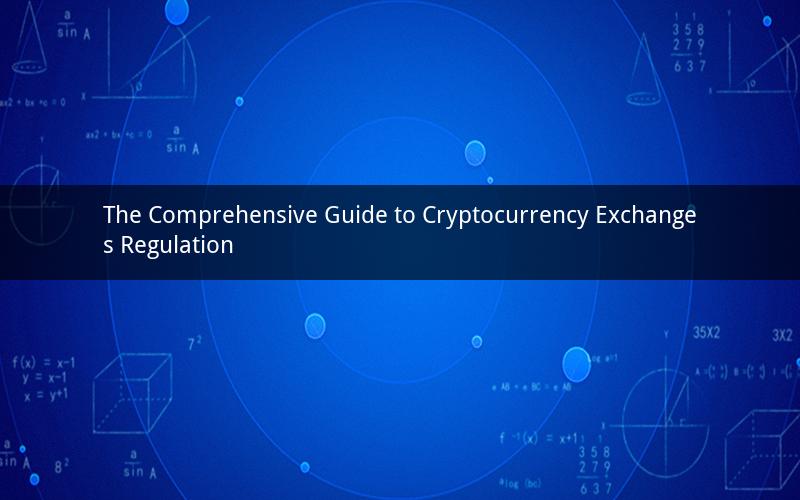
Introduction:
Cryptocurrency exchanges have become an integral part of the digital asset ecosystem, providing users with a platform to buy, sell, and trade various cryptocurrencies. However, with the rise of fraudulent activities and the need to ensure the security of users' funds, the question of whether cryptocurrency exchanges are regulated has gained significant attention. This article aims to provide a detailed overview of the regulation landscape surrounding cryptocurrency exchanges, discussing the reasons behind regulation, the different regulatory frameworks, and the implications for users.
Section 1: Why Are Cryptocurrency Exchanges Regulated?
1.1 Ensuring User Security:
One of the primary reasons for regulating cryptocurrency exchanges is to ensure the security of users' funds. Unregulated exchanges have been notorious for hacks, thefts, and fraud, resulting in substantial financial losses for users. By imposing regulations, authorities can monitor the operations of exchanges, enforce security measures, and protect users from potential risks.
1.2 Preventing Financial Crime:
Cryptocurrency exchanges can be used for various illegal activities, including money laundering, terrorist financing, and other financial crimes. Regulation helps to combat these activities by requiring exchanges to implement Know Your Customer (KYC) and Anti-Money Laundering (AML) policies. These measures help authorities track the flow of funds and prevent illicit activities within the cryptocurrency ecosystem.
1.3 Protecting Market Integrity:
Regulating cryptocurrency exchanges helps maintain market integrity and prevent market manipulation. Unregulated exchanges can create a breeding ground for market manipulation, leading to volatile and unfair trading conditions. By imposing regulations, authorities can ensure fair and transparent trading practices, fostering trust among users and investors.
Section 2: Cryptocurrency Exchange Regulation Frameworks
2.1 Global Regulation:
The regulatory landscape for cryptocurrency exchanges varies significantly across different countries. Some countries have implemented comprehensive regulations, while others have adopted a more lenient approach. This section discusses the key regulatory frameworks in major regions:
2.1.1 United States:
In the United States, the regulatory landscape for cryptocurrency exchanges is complex and involves multiple agencies, including the Securities and Exchange Commission (SEC), Financial Crimes Enforcement Network (FinCEN), and Commodities Futures Trading Commission (CFTC). Exchanges are required to comply with various regulations, including KYC, AML, and securities laws.
2.1.2 Europe:
The European Union has adopted a comprehensive regulatory framework for cryptocurrency exchanges under the Markets in Crypto-Assets (MiCA) directive. The directive aims to establish a harmonized regulatory framework for crypto-assets and related services, including exchanges. Exchanges in Europe are required to comply with various provisions, such as licensing, transparency, and operational standards.
2.1.3 Asia:
Asia has witnessed varying regulatory approaches in countries like China, Japan, and South Korea. While China has implemented a strict ban on cryptocurrency exchanges, Japan has established a robust regulatory framework. Exchanges in Japan are required to obtain a license from the Financial Services Agency (FSA) and comply with strict operational and security requirements.
2.2 Country-Specific Regulation:
In addition to global regulations, many countries have implemented specific regulations for cryptocurrency exchanges. These regulations vary in their scope and intensity, but they generally aim to protect users, prevent financial crime, and maintain market integrity.
Section 3: Implications for Cryptocurrency Exchanges
3.1 Increased Compliance Costs:
One of the primary implications of regulation for cryptocurrency exchanges is the increased compliance costs. Exchanges must invest in resources and technology to meet regulatory requirements, including KYC, AML, and security measures. These costs can be a barrier for smaller exchanges and may lead to consolidation in the industry.
3.2 Enhanced Security and Trust:
Regulation can enhance the security and trust in cryptocurrency exchanges. By enforcing strict operational and security standards, authorities can ensure that exchanges provide a safe and reliable platform for users. This can attract more users and investors, fostering the growth of the cryptocurrency ecosystem.
3.3 Market Stability:
Regulation helps maintain market stability by preventing fraudulent activities and market manipulation. By ensuring fair and transparent trading practices, authorities can create a level playing field for all participants, fostering trust and confidence in the cryptocurrency market.
Section 4: Questions and Answers
Q1: Are all cryptocurrency exchanges regulated in the United States?
A1: No, not all cryptocurrency exchanges in the United States are regulated. However, major exchanges comply with various regulations, including those enforced by the SEC, FinCEN, and CFTC.
Q2: What are the key regulations that cryptocurrency exchanges must comply with in Europe?
A2: In Europe, cryptocurrency exchanges must comply with the Markets in Crypto-Assets (MiCA) directive, which includes provisions on licensing, transparency, operational standards, and investor protection.
Q3: How can users ensure that a cryptocurrency exchange is regulated?
A3: Users can check if a cryptocurrency exchange is regulated by researching its license and regulatory status. They can also look for certifications or endorsements from reputable organizations.
Q4: What are the implications of regulation for smaller cryptocurrency exchanges?
A4: Smaller cryptocurrency exchanges may face increased compliance costs and operational challenges due to regulation. However, regulation can also provide a level playing field and opportunities for growth by attracting more users and investors.
Q5: How does regulation impact the security of cryptocurrency exchanges?
A5: Regulation can enhance the security of cryptocurrency exchanges by enforcing strict operational and security standards. This can reduce the risk of hacks, thefts, and fraud, providing a safer platform for users.
Conclusion:
The regulation of cryptocurrency exchanges is crucial for ensuring user security, preventing financial crime, and maintaining market integrity. While the regulatory landscape varies across different regions, the overall goal is to create a safe and reliable ecosystem for users and investors. By understanding the reasons behind regulation and the implications for exchanges, users can make informed decisions and contribute to the growth and development of the cryptocurrency industry.